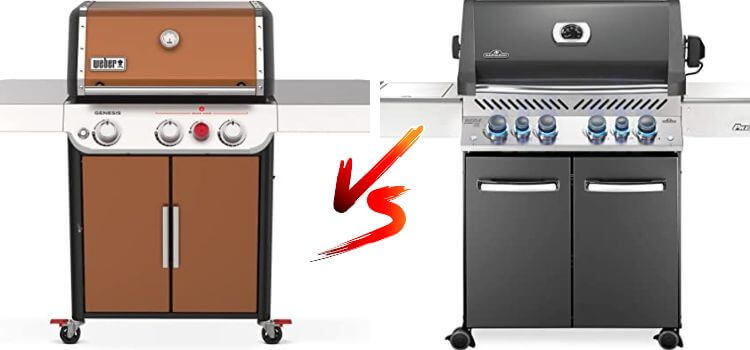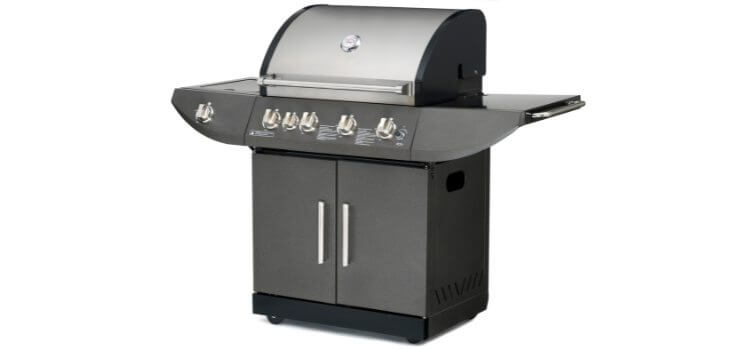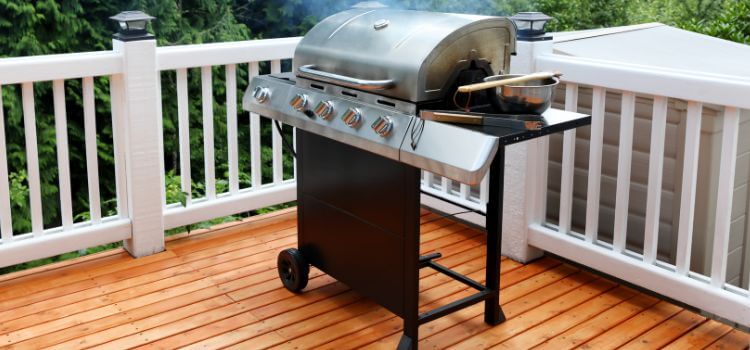As an Amazon Associate, I earn from qualifying purchases
Grilling is more than just a cooking recipe; it’s an institution, a cherished tradition deeply rooted in many cultures worldwide. The mouth-watering aroma of food on the grill, the satisfying sizzle, the exciting anticipation of that first delicious bite – all these elements contribute to the immersive experience that grilling offers. However, for a novice or even a seasoned grill master, deciding between “liquid propane vs natural gas grill” can be perplexing.

What is a Propane Grill?
A propane grill is an outdoor cooking appliance that uses liquid propane gas as its primary fuel source. The propane is typically stored in portable tanks or cylinders, easily attached and detached from the grill for refilling or exchanging.
This type of grill is famous for its convenience and portability. Since the propane tanks are portable, these grills can be used in various outdoor settings, from your backyard to camping sites or tailgate parties. Propane grills also tend to heat up quickly, providing high, consistent heat for cooking.

The propane gas utilized in these barbecues is a byproduct of the natural gas production and petroleum refining industries. It’s easily compressed into a transportable form and is a very efficient fuel source. However, propane grills require monitoring your propane levels and refilling or exchanging the tanks regularly to ensure a continuous supply.
PROS
CONS
Advantages of Grilling with Propane Over Natural Gas
Superior Energy Efficiency
Propane grills are often praised for their energy efficiency. As a fuel, propane contains more than twice the energy per cubic foot than natural gas. Propane grills can heat up faster and reach higher temperatures, reducing your cooking time and potentially enhancing the flavor and sear of your food. Propane grills are a top contender for those seeking efficient and quick grilling.
Unmatched Portability
Propane grills are an excellent choice for grillers who value flexibility and mobility. One of the key selling points of propane grills is their portability. Unlike natural gas grills, which require a fixed connection to a home’s natural gas line, propane grills utilize portable tanks. This feature allows you to move your grill wherever you please, whether it’s different spots in your backyard or off-site locations like campsites or tailgate parties.
No High Upfront Installation Costs
Propane grills shine when it comes to initial costs. While natural gas grills often require professional gas line installation, which can be costly, propane grills can be used immediately with a filled propane tank. This aspect eliminates high upfront costs, making propane grills a more affordable option for those not ready to commit to the initial expense of a natural gas setup.
What is a Natural Gas Grill?
Among the various outdoor cooking devices, a natural gas grill is one that burns natural gas as fuel. Unlike propane grills, which use portable propane tanks, natural gas grills are typically connected to the home’s natural gas supply line.
Natural gas grills are stationary due to their permanent gas line connection. This limits their mobility but provides a constant, uninterrupted fuel supply. This means you don’t have to worry about running out of gas during a barbeque, refilling, or exchanging gas tanks.

One of the major advantages of natural gas grills is their cost-effectiveness. Natural gas is generally cheaper than propane, making these grills less expensive to operate over time. However, they have a higher initial cost, as professional installation is required to connect the grill to your home’s gas line safely.
PROS
CONS
Advantages of Grilling with Natural Gas over Propane Gas
Environmentally Friendly Choice
Natural gas grills stand out as the greener option for eco-conscious consumers. Natural gas is one of the cleanest fossil fuels, producing fewer greenhouse gas emissions compared to propane when burned. This makes natural gas grills a more environmentally friendly choice for outdoor cooking, contributing less to air pollution and global warming.
Cost-Effective Over Time
In terms of operating costs, natural gas grills often come out ahead. Although the initial setup cost for a natural gas grill may be higher due to the need for a fixed gas line, the ongoing cost of natural gas is typically lower than propane. This means that, over time, you could save money on fuel costs with a natural gas grill, making it a more cost-effective option in the long run.
Unparalleled Convenience
One of the primary advantages of natural gas grills is their convenience. Unlike propane grills requiring regular tank refills or exchanges, natural gas grills are connected to your home’s natural gas supply, providing a constant, uninterrupted fuel source. Don’t worry about running out of gas in the middle of a barbecue again. Plus, this fixed setup is perfect for dedicated outdoor kitchen areas.
Consistent, Dry Heat
Natural gas grills provide a consistent, dry heat, making them ideal for various types of cooking, including smoking, roasting, and baking. This dry heat is excellent for creating a crispy exterior on food while keeping the inside moist and juicy. Natural gas grills are known for their excellent temperature control, allowing you to precisely manage your cooking conditions for perfect results every time.
Deep Dive: Liquid Propane vs Natural Gas Grill Side by Side
When comparing propane and natural gas grills, there are several factors to consider:
Cost Differences
Propane Grills: Typically, propane grills are less expensive upfront than natural gas grills. However, the cost of propane gas can add up over time, making them more costly to operate in the long run.
Natural Gas Grills: While these grills are generally more expensive to purchase initially due to the need for a professional installation of a gas line, the cost of natural gas is quite low. This makes them less expensive to operate over time compared to propane grills.
Convenience and Portability
Propane Grills: Propane grills are known for their portability. Since they use portable propane tanks, you can use these grills in various locations, from your backyard to a campsite.
Natural Gas Grills: These grills are stationary due to their permanent gas line connection, limiting their mobility. However, they offer the convenience of a constant fuel supply, eliminating the need for regular tank refills or exchanges.
Performance
Both propane and natural gas grills offer quick heating times, high cooking temperatures, and precise temperature control. Performance-wise, there is no discernible difference between the two.
Environmental Impact
Propane Grills: Propane is a clean-burning fuel but less eco-friendly than natural gas.
Natural Gas Grills: Natural gas is considered more environmentally friendly than propane. It burns cleaner, producing fewer carbon emissions.
Availability:
Propane Grills: Propane is widely available and can be purchased at many locations, including gas stations and grocery stores.
Natural Gas Grills: To use a natural gas grill, your home needs to have a natural gas line. If one isn’t available, you’ll need to have one installed, which can be costly.
Liquid Propane vs Natural Gas Grill: Which is Better to Cook?
When deliberating between propane and natural gas grills, the choice hinges on your unique needs and culinary preferences, as both fuel types deliver exceptional grilling performance. However, discerning grill masters will note some distinctions that may influence their decision.
Heat Generation and Efficiency
Propane and natural gas grills both attain high temperatures swiftly, making them ideal for a range of cooking styles. However, propane grills are often associated with a higher BTU (British Thermal Units) rating compared to their natural gas counterparts.
This implies that propane grills can reach desired cooking temperatures more rapidly, potentially reducing your overall grilling time and enhancing the sear on your steaks.
Flavor Imparted on Food
The question of flavor – whether propane or natural gas grilling impacts the taste of your grilled delicacies – has long been a subject of debate among grilling enthusiasts. Propane grills may slightly enhance the flavor due to its higher heat output.
However, others contend that the flavor differences are negligible. The consensus among most grill aficionados is that the grilling techniques, the quality of the ingredients, and precise temperature control significantly overshadow the type of gas used when it comes to influencing flavor.
Cost Considerations and Convenience
Despite having a higher initial cost, natural gas grills offer the undeniable convenience of an uninterrupted fuel supply. Over time, they can be more cost-effective due to the lower price of natural gas. In contrast, propane grills bring portability and a lower upfront cost. However, the recurring need for propane tank refills or exchanges can lead to higher operating costs.
Environmental Footprint
Due to their cleaner-burning nature, natural gas grills are often seen as the more eco-conscious choice. They generate fewer emissions than propane grills, making them a greener option for environmentally-minded grillers.
The choice between propane and natural gas isn’t a question of one being universally “better” than the other for grilling. Your individual needs, preferences, and circumstances define your perfect grilling experience. If you’re a griller who values mobility and rapid heating and doesn’t mind frequent tank changes, a propane grill might be your perfect match.
On the other hand, if you prefer a stationary setup, seek lower operating costs, and a constant fuel supply, and wish to minimize your environmental impact, a natural gas grill could be your ideal grilling partner. When choosing between a propane and natural gas grill, remember to factor these in.
Leave a Reply